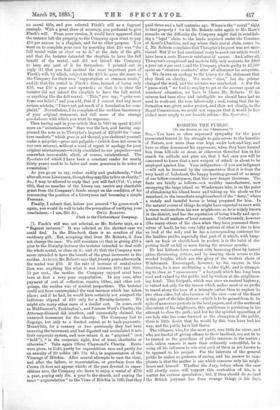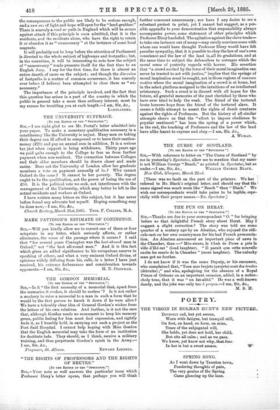ROBBING THE PUBLIC.
[TO THE EDITOR OF THE "SPECTATOR."]
Sin,---You have so often expressed sympathy for the poor persecuted tourist in his struggle to gain access to the beauties of Nature, now more than ever kept under lock-and-key, and have so often denounced his oppressors, when they have hunted him from hill-side or moor, or otherwise thwarted him in his search for solitude and pure air, that I feel sure you will be concerned to know that a new weapon of attack is about to be employed against him. Your indignation—if you are indignant —will not be lessened by the circumstance that it is from the very heart of Lakeland, the happy hunting-ground of so many of our fellow-countrymen, that this new danger threatens. The facts are briefly as follows :—A wealthy manufacturer, now occupying the large island on Windermere lake, is on the point of abandoning his island-home and taking-up his abode on the mainland, in the immediate neighbourhood of the "ferry," where a stately and tasteful house is being prepared for him. In the natural course of things he might have expected to meet with a warm welcome from his new neighbours, as he is widely known in the district, and has the reputation of being kindly and openhanded in all matters of local concern. Unfortunately, however (like many others of his class when they have possessed themselves of land), he has very lofty notions of what is due to him as lord of the soil ; and he has a corresponding contempt for the landless public, especially that part of it which, with knapsack on back or sketch-book in pocket, is in the habit of disporting itself on hill or mere during the summer months.
He has hitherto been content with harassing them by barred gates, threatening notices, and by denying them access to the wooded heights which are the glory of the western shore of Windermere. Encouraged, however, by his success in this direction, he is now meditating a bolder flight, and is attempting to close as " unnecessary " a footpath which has long been used and valued by the public and by visitors at the neighbouring hotel. This footpath, which was once an ancient highway, is valued not only for the reason which makes most of us prefer to travel along the base of a triangle rather than to explore its two other sides, but also because of the view—one of the finest in this part of the lake-district—which is to be gained from it. In spite of numerous protests in the local papers, and of the muttered discontent of his neighbours, this gentleman is persisting in his attempt to close the path ; iiud but for the spirited opposition of one lady who has come forward as the champion of the public, there is little doubt that he would by this time have had his way, and the public have lost theirs. The villagers, who, for the most part, care little for views, and who are fearful of giving offence to their landlord, are not fit to be trusted as the guardians of public interests in the matter ; and, unless rumour is more than ordinarily untruthful, he is using all his influence to win over such of them as are known to be opposed to his project. For the interests of the general public he makes no pretence of caring, and his answer to complaints is that the matter is one which concerns only his neighbours and himself. Whether the Jury, before whom the case will shortly come, will support this contention of his, is a matter for curious speculation ; but, if they should do so (and the British juryman has done strange things in his day), the consequences to the public are likely to be serious enough, and a new era of light and hope will open for the" land-grabber." There is scarcely a road or path in England which will be secure against attack if this principle is once admitted, that it is the residents, and the residents alone, who have the right to retain it or abandon it as " unnecessary " at the instance of some local magnate.
It will probably not be long before the attention of Parliament is directed to the whole subject of highways and footpaths ; but, in the meantime, it will be interesting to note how the subject of " unnecessary " roads presents itself for the first time to an English Jury. I say for the first time, for there is almost an entire dearth of cases on the subject; and though the diversion of footpaths is a matter of common occurrence, it has scarcely ever before (I believe) been attempted to close them as "unnecessary."
The importance of the principle involved, and the fact that this question has arisen in a part of the country in which the public in general take a more than ordinary interest, must be my excuse for troubling you at such length.—I am, Sir, &c., LAKELANDER.



































 Previous page
Previous page